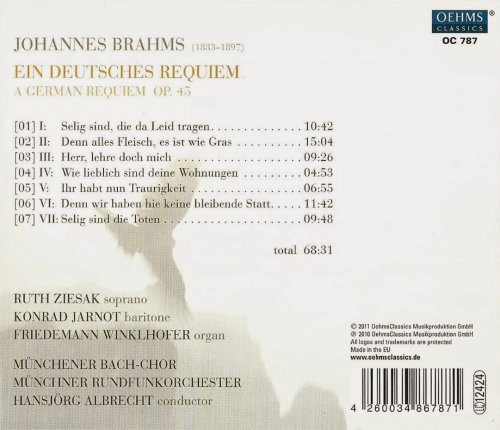Hansjörg Albrecht - Brahms: Ein deutsches Requiem (2011)

Artist: Hansjörg Albrecht
Title: Brahms: Ein deutsches Requiem
Year Of Release: 2011
Label: Oehms Classics
Genre: Classical, Choral
Quality: FLAC (image+.cue,log,scans)
Total Time: 01:08:30
Total Size: 284 Mb
WebSite: Album Preview
Tracklist: Title: Brahms: Ein deutsches Requiem
Year Of Release: 2011
Label: Oehms Classics
Genre: Classical, Choral
Quality: FLAC (image+.cue,log,scans)
Total Time: 01:08:30
Total Size: 284 Mb
WebSite: Album Preview
Johannes Brahms (1833-1897)
Ein deutsches Requiem, op.45
01. I. Selig sind, die da Leid tragen [0:10:42.08]
02. II. Denn alles Fleisch, es ist wie Gras [0:15:04.28]
03. III. Herr, lehre doch mich [0:09:26.49]
04. IV. Wie lieblich sind deine Wohnungen [0:04:53.19]
05. V. Ihr habt nun Traurigkeit [0:06:55.12]
06. VI. Denn wir haben hie keine bleibende Statt [0:11:42.13]
07. VII. Selig sind die Toten [0:09:48.03]
Personnel:
Ruth Ziesak - soprano
Konrad Jarnot - baritone
Münchner Bach-Chor
Münchner Rundfunkorchester
Hansjörg Albrecht - conductor
There are 88 available recordings of the great Brahms Requiem, according to ArkivMusic, and I alone have reviewed more than 10 for Fanfare . Do we need yet another Brahms Requiem CD? “The answer is ‘yes’ if the ‘yet another’ has something new and worthwhile to offer in the performance of this magnificent work,” I replied in a previous review. That, of course, does not mean that every favorably reviewed disc necessarily belongs in everyone’s collection. Conductor Hansjörg Albrecht, his soloists and chorus, and the Munich Radio Orchestra bring forth a truly worthy offering of Brahms’s masterpiece. Clarity of choral and orchestral detail are noteworthy here, especially orchestral detail, although not consistently so.
The opening movement (“Selig sind, die da Leid tragen”) is taken at a rather slow tempo in contrast to the faster tempo of the reflexively parallel concluding movement (“Selig sind die Toten”). This contrast is seductive, even when separated by five intervening movements that total almost 50 minutes. The complex fugue that concludes the third movement is a bit too muddled (as is the case in many other otherwise fine performances—blame Brahms for his thickly textured writing), but the violin-section line can be heard more clearly here than anywhere else in my memory—and a beautiful line it is. The complex sixth movement begins with a very slow, ominous tempo, which is all the more effective against the entry of the contrasting fortissimo after zu der Zeit der letzten Posaune.
The technical quality of this performance is excellent on the part of the conductor, orchestra, soloists, and chorus. My only complaint, a personal one, is that Konrad Jarnot’s baritone has too much vibrato for this music, especially in the third movement. In the sixth movement, Jarnot sounds much better.
This is a fine and dedicated performance of the Brahms Requiem from which the listener comes away with a better understanding of the music and its message. The competition may be formidable, viz. Klemperer, Rattle, and Tennstedt, to name but a few, but this is a good one to have. -- Burton Rothleder
The opening movement (“Selig sind, die da Leid tragen”) is taken at a rather slow tempo in contrast to the faster tempo of the reflexively parallel concluding movement (“Selig sind die Toten”). This contrast is seductive, even when separated by five intervening movements that total almost 50 minutes. The complex fugue that concludes the third movement is a bit too muddled (as is the case in many other otherwise fine performances—blame Brahms for his thickly textured writing), but the violin-section line can be heard more clearly here than anywhere else in my memory—and a beautiful line it is. The complex sixth movement begins with a very slow, ominous tempo, which is all the more effective against the entry of the contrasting fortissimo after zu der Zeit der letzten Posaune.
The technical quality of this performance is excellent on the part of the conductor, orchestra, soloists, and chorus. My only complaint, a personal one, is that Konrad Jarnot’s baritone has too much vibrato for this music, especially in the third movement. In the sixth movement, Jarnot sounds much better.
This is a fine and dedicated performance of the Brahms Requiem from which the listener comes away with a better understanding of the music and its message. The competition may be formidable, viz. Klemperer, Rattle, and Tennstedt, to name but a few, but this is a good one to have. -- Burton Rothleder

![Turku Jazz Orchestra & Henri Lyysaari - The Labyrinth Garden (2026) [Hi-Res] Turku Jazz Orchestra & Henri Lyysaari - The Labyrinth Garden (2026) [Hi-Res]](https://www.dibpic.com/uploads/posts/2026-02/1770128890_folder.jpg)
![Beverly Glenn-Copeland - Laughter In Summer (2026) [Hi-Res] Beverly Glenn-Copeland - Laughter In Summer (2026) [Hi-Res]](https://www.dibpic.com/uploads/posts/2026-02/1770134638_folder.jpg)
![Paddy Fitzgerald - Floot Bird (2026) [Hi-Res] Paddy Fitzgerald - Floot Bird (2026) [Hi-Res]](https://img.israbox.com/img/2026-01/31/hc7n83ki2t4vuc9euigby2lfm.jpg)


![Chris Forsyth - Chris Forsyth Plays Love Devotion Surrender (2024) [Hi-Res] Chris Forsyth - Chris Forsyth Plays Love Devotion Surrender (2024) [Hi-Res]](https://www.dibpic.com/uploads/posts/2026-02/1770021495_cover.jpg)


